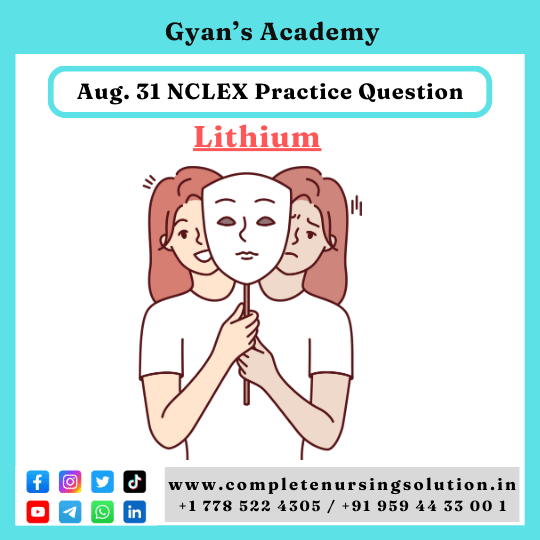Lithium Toxicity
Features
Acute: gastrointestinal findings - nausea, vomiting, diarrhea; neurologic findings occur later Features
Chronic: neurologic - ataxia, sluggishness, confusion, agitation, neuromuscular excitability (coarse tremor)
Prevention
- Avoid sodium depletion; low sodium intake precipitates lithium toxicity Prevention
- Eat regular diet & drink adequate fluids (2-3 L/day)
- Therapeutic level is 0.6-1.2 mEq/L (0.6-1.2 mmol/L)
- Level >1.5 mEq/L (1.5 mmol/L) is considered toxic
Lithium carbonate is a mood stabilizer used for the treatment of bipolar disorder. Lithium levels take some time to reach therapeutic levels, often up to a few weeks (Option 4). Clients will need to have their lithium levels carefully monitored when starting therapy, as the therapeutic range is narrow (0.6-1.2 mEq/L [0.6-1.2mmol/L]). Blood sodium levels affect the renal excretion of lithium, as lithium and sodium are excreted in a parallel mechanism by the kidney. If sodium intake is limited or the body is depleted of its normal sodium (eg, excessive perspiration, vomiting, diarrhea), lithium is reabsorbed by the kidneys, increasing the possibility of toxicity (Option 3). Therefore, clients on lithium must consume adequate sodium in the diet. Care should be taken to avoid dehydration, so diuretic medications and substances with a diuretic effect (eg, coffee, cola, tea, alcoholic beverages) must be limited or avoided, and clients are advised to drink 2-3 liters of water each day (Options 1 and 2).
Lithium Toxicity
Features
Acute: gastrointestinal findings - nausea, vomiting, diarrhea; neurologic findings occur later Features
Chronic: neurologic - ataxia, sluggishness, confusion, agitation, neuromuscular excitability (coarse tremor)
Prevention
- Avoid sodium depletion; low sodium intake precipitates lithium toxicity Prevention
- Eat regular diet & drink adequate fluids (2-3 L/day)
- Therapeutic level is 0.6-1.2 mEq/L (0.6-1.2 mmol/L)
- Level >1.5 mEq/L (1.5 mmol/L) is considered toxic
Lithium carbonate is a mood stabilizer used for the treatment of bipolar disorder. Lithium levels take some time to reach therapeutic levels, often up to a few weeks (Option 4). Clients will need to have their lithium levels carefully monitored when starting therapy, as the therapeutic range is narrow (0.6-1.2 mEq/L [0.6-1.2mmol/L]). Blood sodium levels affect the renal excretion of lithium, as lithium and sodium are excreted in a parallel mechanism by the kidney. If sodium intake is limited or the body is depleted of its normal sodium (eg, excessive perspiration, vomiting, diarrhea), lithium is reabsorbed by the kidneys, increasing the possibility of toxicity (Option 3). Therefore, clients on lithium must consume adequate sodium in the diet. Care should be taken to avoid dehydration, so diuretic medications and substances with a diuretic effect (eg, coffee, cola, tea, alcoholic beverages) must be limited or avoided, and clients are advised to drink 2-3 liters of water each day (Options 1 and 2).




Hey there! Do you know if they make any plugins to help with Search
Engine Optimization? I’m trying to get my website to rank for some targeted keywords but I’m not seeing very good results.
If you know of any please share. Appreciate it! I saw similar text here:
Change your life
I’m extremely inspired with your writing talents and also with the format for your blog. Is that this a paid subject matter or did you customize it yourself? Either way keep up the excellent quality writing, it is uncommon to see a nice weblog like this one nowadays. I like completenursingsolution.in ! I made: BrandWell
I’m extremely inspired along with your writing talents as neatly as with the layout to your weblog. Is this a paid subject or did you modify it yourself? Anyway stay up the excellent quality writing, it is rare to look a nice weblog like this one today. I like completenursingsolution.in ! My is: Snipfeed
I am in truth delighted to gleam at this blog posts which consists of tons of of use facts, thanks for providing such data.
This is the gentle of writing I in fact appreciate.
More articles like this would frame the blogosphere richer.
Thanks on putting this up. It’s understandably done.
Thanks recompense sharing. It’s first quality.
I’ll certainly bring back to be familiar with more.
Lottery trends are fascinating – seeing patterns (or lack thereof!) is key. It’s great to find communities focused on responsible gaming, like the folks at 19slot download – a secure space to enjoy games! Hoping for good luck to all!
Interesting analysis! The blend of classic casino feel with modern tech, like at jljl7799 vip, is key for attracting both new & seasoned players. Easy registration is a huge plus too!
Interesting read! It’s smart to be cautious with online casinos, verifying security is key. Heard good things about quick registration at phpopular vip – a smooth start is a big plus, right? Always gamble responsibly!
Interesting points about bankroll management! Seeing platforms like jljl13 app cater to local payment methods (GCash, PayMaya) really boosts accessibility for Filipino players. Good stuff!
Really interesting read! It’s cool to see platforms like peso888 club focusing on learning as you play – that security training module sounds genuinely helpful for new players. Responsible gaming is key! 👍
Interesting analysis! It’s amazing how patterns emerge even in seemingly random events. Thinking about platforms like phpgames games, their systems also rely on understanding probabilities – and offering a fun experience, of course! A legit platform is key.
It’s fascinating how easily accessible gaming has become – even account verification is streamlined now! Platforms like jljl88 link download are shaping player expectations. Understanding impulse control is key, though – responsible gaming first!
Achievement-based service, performance matches the promises. Achievement appreciation. Performance excellence.
hwdedfywtyrfhfvivmhvdoiexlzgwo
Dry Cleaning in New York city by Sparkly Maid NYC
I like assembling useful information , this post has got me even more info! .
As soon as I discovered this site I went on reddit to share some of the love with them.
Unquestionably believe that which you said. Your favorite justification appeared to be on the web the easiest factor to keep in mind of. I say to you, I definitely get irked whilst other people consider concerns that they just do not recognize about. You managed to hit the nail upon the highest and also defined out the whole thing with no need side-effects , people can take a signal. Will probably be again to get more. Thank you
Thank you for your sharing. I am worried that I lack creative ideas. It is your article that makes me full of hope. Thank you. But, I have a question, can you help me?
I view something really special in this site.
I wanted to jot down a comment to say thanks to you for these great tactics you are sharing on this site. My rather long internet search has at the end of the day been compensated with incredibly good suggestions to talk about with my family and friends. I ‘d assert that most of us visitors actually are very blessed to live in a very good community with so many lovely individuals with very helpful opinions. I feel quite blessed to have discovered your webpage and look forward to really more entertaining times reading here. Thanks again for everything.
Yay google is my king helped me to find this outstanding internet site! .
I’ve been browsing on-line more than 3 hours these days, but I by no means found any attention-grabbing article like yours. It is pretty worth enough for me. In my view, if all site owners and bloggers made excellent content material as you probably did, the web will be much more helpful than ever before.